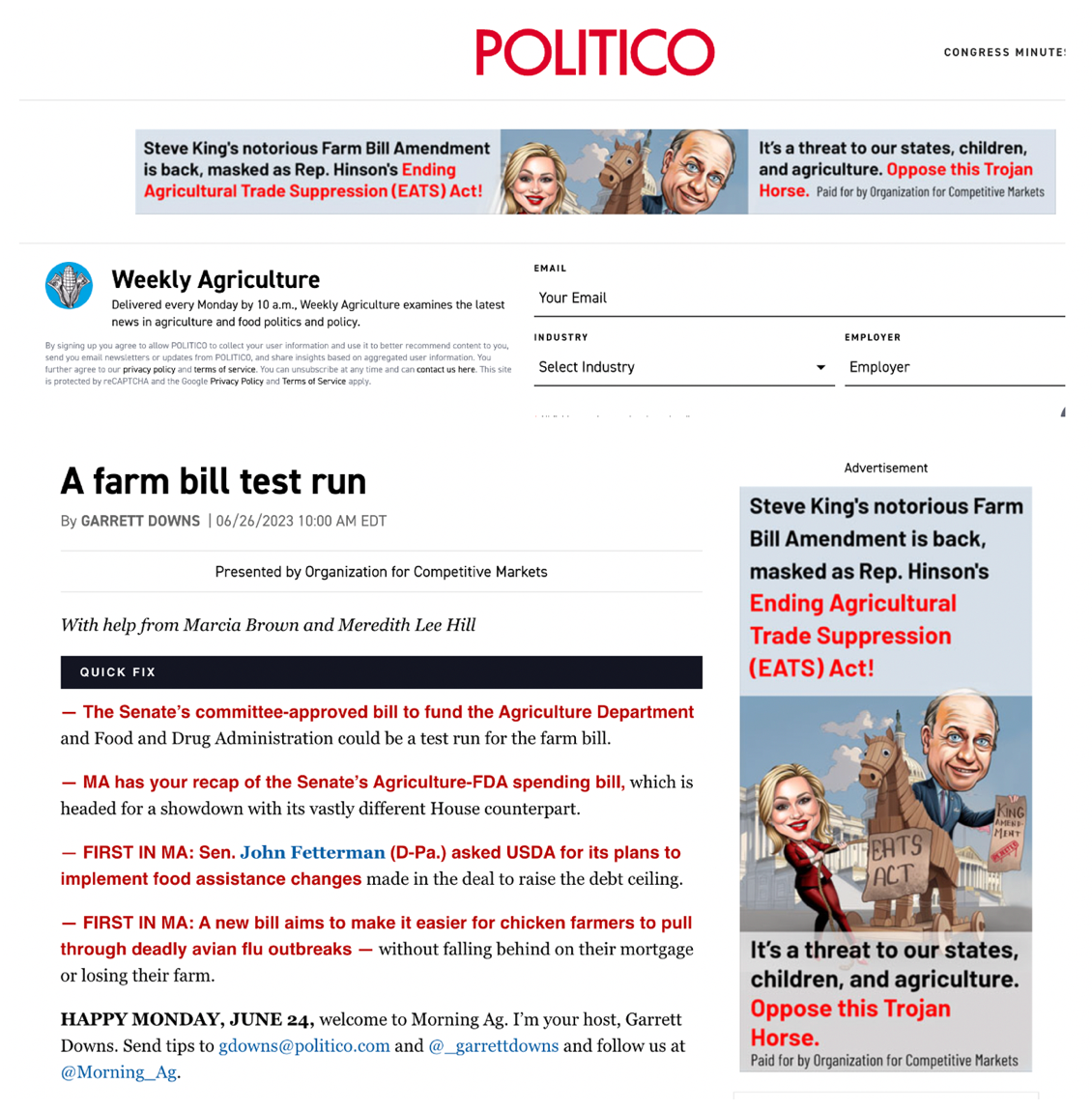Washington, D.C. – The Organization for Competitive Markets (OCM) and Competitive Markets Action (CMA) announced an expansion of its campaign against the Ending Agriculture Trade Suppression (EATS) Act led by Rep. Ashley Hinson, R-IA in the House and Sen. Roger Marshall, R-KS in the Senate. The campaign centers the opposition of family poultry and dairy farms as well as independent cattle ranchers to the EATS Act. Specifically, it highlights their concern that Chinese interests are not solely focused on land rights; they are aggressively acquiring entire agricultural companies, posing a significant threat to our farming sovereignty.
Enacting the Hinson/Marshall Ending Agricultural Trade Suppression (EATS) Act via the Farm Bill would eliminate hundreds of state agricultural laws, effectively paving the way for even more foreign intrusion without guardrails. This absence of rules, particularly those that support American family farmers and ranchers, would create an environment in which large Chinese corporations like Smithfield Foods and others can easily expand across all 50 states without having to comply with state laws that protect rural communities, American farming families, and consumers.
The ad campaign continued this week with OCM’s ad buy in Politico Morning and Weekly Ag each day this week and with CMA’s ad buy that included a takeover of The Daily Caller’s homepage on Tuesday. The ads encourage readers to call their elected officials and ask them to vote no on any Farm Bill that contains the Steve King rebranded EATS Act. OCM and CMA plan to continue the ad campaign throughout the course of 2023 until the Farm Bill is finalized and enacted.
The EATS Act is a revamped version of the controversial “King Amendment” pushed by former Rep. Steve King (R-IA). Because the bill virtually eliminates states’ rights in the agriculture policy space, and because of the precedent this sets, this idea failed in the past two farm bills. Despite this being a settled area of law that most market stakeholders have already prepared for, some legislators have rebranded the measure, possibly expecting states-level stakeholders not to notice.
If enacted into law, the Hinson/Marshall EATS Act will erase countless laws passed by state and local governments nationwide that benefit family farms over foreign conglomerates. This includes laws that support dairy farmers, baby food safety, and the control of invasive pests. Put simply, this bill permanently strips power from legislators at state and local levels of government.
Key Quotes
“If the King Amendment or EATS act or anything like it is added to the farm bill it will be devastating for dairy producers across America,” said Deborah Mills, chair of the National Dairy Producers Organization and a board member at OCM.
“We must prevent the EATS Act from being included in the upcoming Farm Bill and exhaust every resource available to keep this poison pill from becoming law,” said Jonathan Buttram, the president of the Alabama Contract Poultry Growers Association and OCM board Treasurer. “U.S. House and Senate Agriculture Committee leaders Debbie Stabenow, Glenn Thompson, John Boozman, and David Scott should reject this egregious attack against state agriculture laws.”
“The EATS Act is nothing but a Trojan Horse designed to put family farmers out of business and give multinational conglomerates like JBS and Chinese-owned Smithfield an even greater advantage than they already have.” said Mike Schultz, senior vice-president at OCM and founder of the Kansas Cattlemen’s Association. “It’s a crying shame to see my Senator Roger Marshall leading this assault on producers and states’ rights.”
“OCM is ready, willing, and able to roll up our sleeves and dig in to help prevent the EATS Act from being enacted in the upcoming Farm Bill,” said Taylor Haynes, president of OCM. “American family farmers will not stand for this attack on states’ rights that could land our farms under the control of the Chinese Government.
“If the Farm Bill includes Hinson and Marshall’s egregious provision and passes it, companies like the Chinese-owned Smithfield and Brazil-based JBS will own livestock production in the United States,” said Marty Irby, president at CMA and board secretary at OCM. “We’d rather have no farm bill than a farm bill with Hinson’s EATS Act included.”
OCM Ads in Politico Weekly Ag:

The EAT’s Act is a gift to the Chinese and Brazil governments whose agribusiness conglomerates have lobbied to remove U.S. state and local protections for rural communities. If passed, it’ll also be a devastating blow to multigenerational American farmers and ranchers who’d be forced to compete against these foreign industrial operations opening in their locales.
Furthermore, the EATS Act would create a race to the bottom when it comes to food safety in our country, eliminating state laws protecting baby food and the safety of milk for our families.
OCM and CMA are committed to fighting against the EATS Act to ensure that America’s farmers and ranchers don’t get wiped out, our dairy farmers continue to benefit from state laws they’ve worked so hard to pass, and families are able to still purchase safe, affordable food.
The Organization for Competitive Markets (OCM) is a 501(c)(3) non-profit based in Lincoln, Nebraska. The foundation of the Organization for Competitive Markets is to fight for competitive markets in agriculture for farmers, ranchers and rural communities. True competition reduces the need for economic regulation. Our mission, and our duty, is to define and advocate the proper role of government in the agricultural economy as a regulator and enforcer of rules necessary for markets that are fair, honest, accessible and competitive for all citizens.
Competitive Markets Action (CMA) is a 501(c)(4) non-profit based in Washington, D.C. that was formed with the mission of advancing policy to promote more regenerative and sustainable agriculture, and competitive markets in the U.S., and to defend against attacks on states’ rights by the federal government. CMA works to raise awareness of the harm caused to the farmer, the consumer and our U.S. economy as a whole in an effort to bring about legislative and regulatory reforms.


Join the conversation!